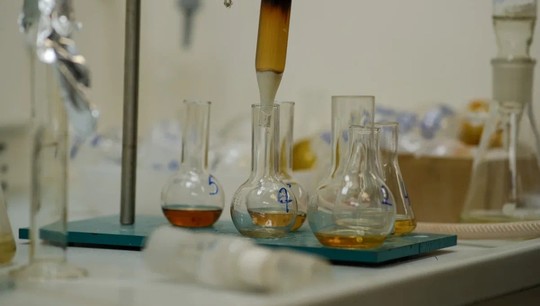Ural Federal University Scientists Create Substance To Treat Neurological Disorders
The international team of scientists, including chemists from the Ural Federal University, has developed a substance that may become the basis for drugs that suppress or alleviate a number of neurological disorders. These include, for example, psychosis, schizophrenia, Parkinson’s and Huntington’s diseases, etc. The scientists reported the development and first results of the study in the Journal of Biomolecular Structure and Dynamics. The study was supported by a grant from the Ministry of Science and Higher Education of the Russian Federation (Project No. 075-15-2020-777).
“We found that the enzyme Phosphodiesterase 10A, which is produced in the body, is directly linked to neurological disorders. If you inhibit this enzyme, you can significantly slow down or even suppress the disease. For this purpose, we used a set of derivatives of 1,2,3-triazole, a pharmacophore whose fragments are contained in many drugs, and modeled the structure of the putative TP-10 inhibitor. We hypothesize that it would have a positive effect on conditions associated with brain dysfunction by reducing the activity of the Phosphodiesterase 10A enzyme. Other inhibitors developed by foreign companies still have no reliable antipsychotic efficacy so far,” notes Dhananjay Bhattacherjee, Senior Researcher at the Department of Organic and Biomolecular Chemistry at Ural Federal University.
To study the properties of the substance, which can become the basis for a new drug, scientists applied extensive computational methods and various types of analysis based on the available literature data. In particular, using computer simulations, they found that the created inhibitor is nontoxic and perfectly absorbed into the intestine – which means that it is possible to take the drug orally to have the necessary effect on the nervous system.
Biochemical studies have also shown that the enzyme Phosphodiesterase 10A can also be linked to the occurrence of certain types of cancerous tumors.
“The functions of many enzymes in the body are not yet fully understood. It so happens that a well-known drug that treats one disease also treats a completely different disease. The same is true for our substance: we have suggested that by acting on the enzyme Phosphodiesterase 10A, it is possible to influence the development of cancerous tumors. However, this needs to be verified for sure,” concludes Grigory Zyryanov, Professor at the Department of Organic and Biomolecular Chemistry at Ural Federal University.
The next step is an experimental study. The biochemists plan to study the effect of the inhibitor on living organisms.

